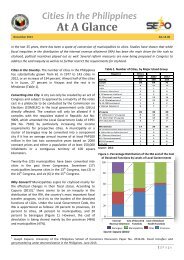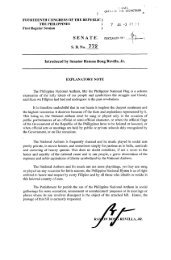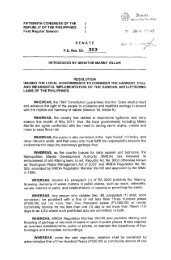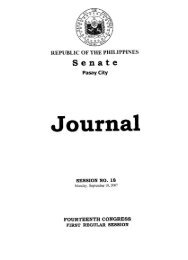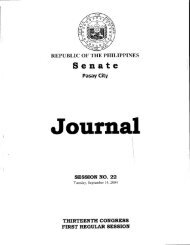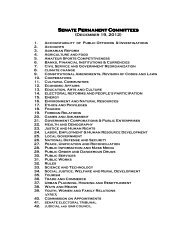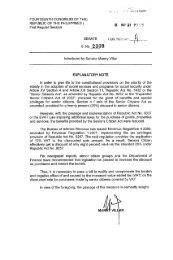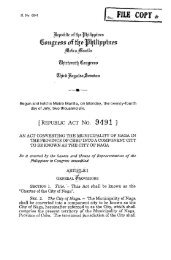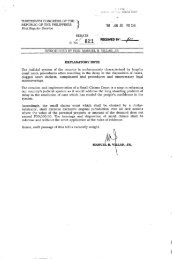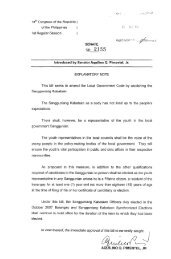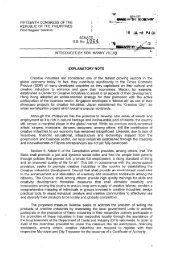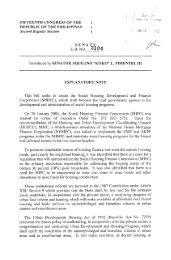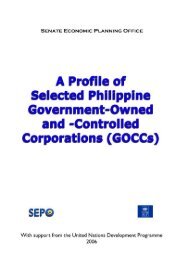SBN-228 (as filed) - Senate
SBN-228 (as filed) - Senate
SBN-228 (as filed) - Senate
Create successful ePaper yourself
Turn your PDF publications into a flip-book with our unique Google optimized e-Paper software.
FOURTEENTH CONGRESS OF THE REPUBLIC )<br />
OF THE PHILIPPINES )<br />
First Regular Session 1<br />
S.B. No. SENAY2<br />
Introduced by Senator Loren Legarda<br />
EXPLANATORY NOTE<br />
This bill seeks to establish <strong>as</strong>sistance to and improve the state of the madr<strong>as</strong>ah<br />
system in the country today.<br />
Section 2, paragraph 2 of Article XIV of the 1987 Constitution states that "the<br />
State shall establish, mainidin and support a complete, adequate, and integrated system<br />
of education relevant to the needs of the people and society. Pursuant to this, the State<br />
h<strong>as</strong> a responsibility to strengthen and develop the Philippine madr<strong>as</strong>ah system. Today,<br />
Madr<strong>as</strong>ah institutions have evolved into three types:<br />
1. Traditional or Weekend Madr<strong>as</strong>ak - cl<strong>as</strong>ses are held on weekends<br />
(Saturdays and Sundays) only or on days agreed upon by the<br />
teachers and students. There is no formal curriculum, hence it is<br />
non-graded and may have multi-age groupings. The hiring of<br />
teachers requires simple qualification like graduates of a Madr<strong>as</strong>ah<br />
or an Imam (Muslim religious leader). The students on this type of<br />
Madr<strong>as</strong>ah are also likely the students enrolled in public schools.<br />
2. Developmental or Formal Madr<strong>as</strong>ah - offers hierarchically structured<br />
education and sequential learning generally attuned with the<br />
formal education system. They offer kindergarten, primary, and<br />
secondary education.<br />
3. Integrated Maar<strong>as</strong>ak - offers the public school curriculum and<br />
Arabic literacy, <strong>as</strong> well <strong>as</strong>, Islamic religious subjects.<br />
According to International Religious Freedom Report 2003 rele<strong>as</strong>ed by the<br />
Bureau of Democracy, Human Rights and Labor of the United States, there are at le<strong>as</strong>t<br />
1,569 Islamic schools (madr<strong>as</strong>ahs) across the Philippines. Of these, 53 percent are<br />
located in the Autonomous Region in Muslim Mindanao (ARMM).<br />
The said Report likewise reveal that there are 1,140 madr<strong>as</strong>ahs seeking financial<br />
<strong>as</strong>sistance from local and foreign donors that are registered with the Office on Muslim<br />
Affairs, while only 35 are registered with the Department of Education. This situation is<br />
due primarily to the inability of the madr<strong>as</strong>ahs to meet the Department of Education's<br />
accreditation standards for curricula and adequate facilities.<br />
That is why this bill mandates the Department of Education (DepEd), in close<br />
coordination with the Commission on Higher Education (CHED), Office of Muslim
Affairs (OMA), and the Autonomous Region in Muslim Mindanao (ARMM), to provide<br />
mechanisms to improve 5e quality of Madr<strong>as</strong>ah education <strong>as</strong> well <strong>as</strong> open the<br />
opportunity for more Muslim students to benefit from said educational system by<br />
maximizing the use of existing resources of private education.<br />
Moreover, this proposed me<strong>as</strong>ure also<br />
-<br />
aims to provide financial <strong>as</strong>sistance to<br />
madr<strong>as</strong>ah systems in the form of 1.) Madr<strong>as</strong>ah infr<strong>as</strong>tructure development fund; 2.)<br />
Programs and <strong>as</strong>sistance to students and teachers in madr<strong>as</strong>ah schools; 3.) Nutrition<br />
and feeding program for young children; 4.) Cl<strong>as</strong>sroom facilities; 5.) Textbook<br />
<strong>as</strong>sistance fund; 6.) In-service training fund for teachers; and 7.) Scholarship grants to<br />
children of teachers.<br />
To allow the local madr<strong>as</strong>ah system to take full advantage of these development<br />
opportunities will provide more educational opportunities for Muslim Filipinos.<br />
In view of the foregoing, immediate p<strong>as</strong>sage of this bill is earnestly sought.<br />
LOREN LEGARDA<br />
Senator
FOURTEENTH CONGRESS OF THE REPUBLIC )<br />
OF THE PHILIPPINES 1<br />
First Regular Session<br />
SENA<br />
S.B. No.<br />
Introduced by Senator Loren Legarda<br />
98 J&d 30 134 :.!<br />
AN ACT<br />
PROVIDING GOVERNMENT ASSISTANCE TO MADRASAH EDUCATION<br />
SYSTEM, APPROPRIATING FUNDS THEREFOR AND FOR OTHER PURPOSES<br />
Be it enacted by the <strong>Senate</strong> and the House of Representatives of the Philippines in<br />
Congress <strong>as</strong>sembled:<br />
Section 1. Shovt Title. This Act shall be known <strong>as</strong> the “Fund Assistance to<br />
Madr<strong>as</strong>ah Education Act of 2007.’’<br />
Sec. 2. Declaration ofpolicy. It is a declared policy of the State in conformity<br />
with the mandate of the Constitution, to promote and make quality education accessible<br />
to all Filipino citizens regardless of cultural origin, conviction, creed or belief. The State<br />
also recognizes the complementary roles of public and private educational institutions<br />
in the country’s educational system and the invaluable contribution of private<br />
educational institutions to educate its citizenry, and this includes the Madr<strong>as</strong>ah School<br />
in Muslim Mindanao and other are<strong>as</strong> in the country where Muslim population<br />
abounds.<br />
The State shall also, <strong>as</strong> a matter of policy, establish a fund for Madr<strong>as</strong>ah<br />
Infr<strong>as</strong>tructure Development apart from maintaining a system of scholarship grants,<br />
student loan programs, teacher development program, subsidies and other incentives<br />
which shall be available to deserving students especially to the underprivileged.<br />
Further, the State shall encourage non-formal, informal and indigenous learning<br />
systems <strong>as</strong> well <strong>as</strong> self-learning, particularly those that respond to community needs.<br />
For this purpose, the State mandates the Department of Education (PepEd), in<br />
close coordination with the Commission on Higher Education (CHED), Office of<br />
Muslim Affairs (OMA), and the Autonomous Region in Muslim Mindanao (ARMM), to<br />
provide mechanisms to improve the quality of Madr<strong>as</strong>ah education <strong>as</strong> well <strong>as</strong> open the<br />
opportunity for more Muslim students to benefit from said educational system by<br />
maxiinizing the use of existing resources of public and private education.<br />
Sec. 3. Madr<strong>as</strong>ah Curriculum. The Madr<strong>as</strong>ah curriculum shall be enriched and<br />
harmonized to make it compatible with the curriculum of the Philippine formal<br />
education system. Equivalency, learning accreditation, experience-b<strong>as</strong>ed learning and
other innovative education approaches shall be utilized in order to make possible the<br />
smooth transition of learners from the Madr<strong>as</strong>ah education system to the formal<br />
education system and vice-versa.<br />
Sec. 4. Criteria for Assistance. The programs for <strong>as</strong>sistance shall be b<strong>as</strong>ed on a<br />
set of criteria which include, among others, tuition fees charged by the schools, the<br />
socio-economic needs of the students giving priority to those who come ,from the<br />
poorest sector of society, overall performance of the schools, the academic qualifications<br />
and the financial needs of both students and teachers.<br />
In addition to the aforementioned criteria, shtdents who may qualify for<br />
scholnrship <strong>as</strong>sistance in Madr<strong>as</strong>ah schools can continue to study in higher education<br />
institution; Provided, that, they p<strong>as</strong>s the minimum requirement of said program.<br />
Sec. 5. Forms ofAssistance. For purposes of this Act, apart from infr<strong>as</strong>tructure<br />
development fund and a system of scholarship grants, student loan programs, teacher<br />
development program, subsidies and other incentives, programs and <strong>as</strong>sistance to<br />
students and teachers in Madr<strong>as</strong>ah schools consist of the following:<br />
1. Nutrition and feeding Program for Young Children;<br />
2. Cl<strong>as</strong>sroom Facilities such <strong>as</strong> desks, tables, chalkboards and other b<strong>as</strong>ic<br />
cl<strong>as</strong>sroom needs;<br />
3. Textbook Assistance Fund;<br />
4. SchoIarship Grants to deserving students;<br />
5. Education Loan Fund;<br />
6. In-Service training Fund for Teachers;<br />
7. Scholarship Grants to children of teachers.<br />
Sec. 6. Funding. The funds necessary for the implementation of this Act shall be<br />
provided in the General Appropriations Act (GAA) in the amount of P500,000,000.00<br />
and shall be charged under,the current appropriations of the Department of Education.<br />
Sec. 7. Implementing Rules and Guidelines. The Secretary of Education, in close<br />
coordination with the Chairman of the Commission on Higher Education, Office of<br />
Muslim Affairs and the Autonomous Region in Muslim Mindanao, shall issue rules and<br />
regulations necessary for the effective implementation of this Act.<br />
Sec. 8. Repealing Clause. All laws, presidential decrees, executive orders,<br />
presidential proclamation,' rules and regulations or parts thereof contrary to or<br />
inconsistent with this Act are hereby repealed or modified accordingly.<br />
Sec. 9. Separability Clause. If any provision of this Act is. declared<br />
unconstitutional, the same shall not effect the validity and effectivity of the other<br />
provisions hereof.<br />
Sec. IO. Effecfivify. This Act shall take effect fifteen (15) days after its complete<br />
publication in two (2) newspapers of general circulation.<br />
Approved,



